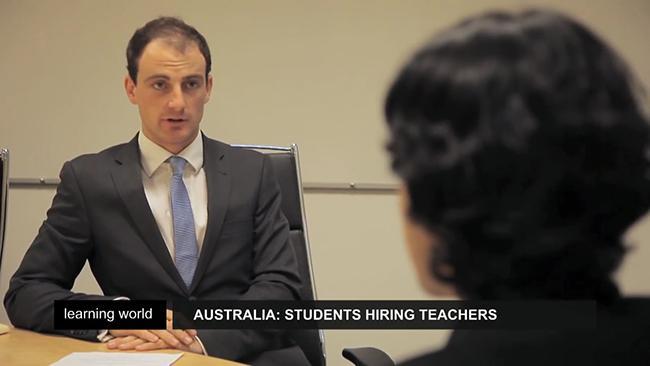Why are so many teachers fleeing the classroom?
FORTY per cent of new teachers quit during their first year on the job. Yes, almost half. They’re not leaving because of the kids.

IN A profession where graduates head out into the world optimistic about nurturing children and bringing about change, it seems reality hits hard and fast.
Statistics show that early career teachers are leaving in droves, with close to 40% exiting from the profession within the first year of their teaching career, a number that has tripled in the last 6 years.
And it’s affecting our kids. Dr Phillip Riley, Director of the Australian Principal Health and Wellbeing Survey at Monash University, says it is extremely disruptive to learning if teachers are constantly changing, something that’s become a huge issue in many schools. “Students need continuity and a predictable environment to optimise their learning. It is often connected with increased behavioural issues in student populations.”
However, it’s not just the kids that are affected — the economy also takes a blow, with replacement costs having been estimated at 0.2% of annual GDP. “That is a lot of money that could be put to much better use,” Dr Riley says. “It can also affect morale in schools more generally.”
Dr Riley says there are several reasons for the industry exodus, including the lack of job security in teaching contracts, being restricted in the way they can contribute to students’ learning and wellbeing, poor mentoring, and difficulty in their new workplace. He feels that one teacher summed it up by saying “I felt well prepared for the classroom, but nobody prepared me for the staffroom.”

BULLYING NOT ONLY IN THE PLAYGROUND
Someone who can undoubtedly relate to this is Leila*, who, at 21, was bullied by the deputy principal in her first teaching job. Leila says her superior withheld information from her, badmouthed her to parents and isolated her from her team.
However, things became more serious when he cornered her alone late one afternoon with a false accusation, swearing at her and calling her names like ‘fat bitch’, ‘stupid bitch’, and ‘stupid little girl’, chasing Leila to her car as she fled in a panic. An investigation followed and found in Leila’s favour, however instead of the deputy being reprimanded or demoted, he went on to become a principal at a large primary school in a major city.
Leila was granted a transfer to a new school to start afresh, but says she was shocked to then find herself working for the principal from hell. “Before I arrived she found out my backstory and spoke to the deputy principal. She told me she had made it her mission to vindicate her ‘respected colleague’ and have me sacked once and for all.”
Leila says the principal micromanaged her excessively, enforced impossible workloads and went through her belongings regularly. Leila became distressed and suicidal, and when she found out she and her husband needed IVF treatment to conceive, her principal refused her time off for an appointment, telling her to choose between having children or teaching.
When her request for leave the following year was denied, she resigned. “After two bad experiences in a row I was convinced it was me, I was a bad teacher and a bad person. I didn’t deserve to live, let alone teach,” she says. However, Leila found out there were dozens of complaints already made against her former principal and is still shocked at the terrible duty of care at this behaviour being allowed to continue.
APATHY REPLACES PASSION
Nina* graduated as a mature-aged student and was offered a contract with a special education high school, which she loved, and the next year became the performing arts teacher, a role she took on with complete passion, but says throughout that year some things disturbed her.
“This special school is part of a larger school where every one preached integration,” Nina explains. “There was none, and the kids were ostracised from the rest of the school. I saw things among the staff that I didn’t like, the way they treated and handled the students and then the politics that carried on.”
When obvious and vocal nepotism saw another teacher employed and quickly offered a full time contract, Nina was left with minimal hours as a result. After complaining about this and a number of issues to the principal, she was offered a position in the main school’s art department, but it wasn’t ideal.
“I had no experience in teaching high school art and I was left largely on my own,” Nina explains. “There was no support for me and I even had another art teacher say that if I expected her to mentor me then the school had to give her more release time because she wasn’t prepared to do it in her non-interaction time. I felt like a second grade citizen and I felt so dumb. I tried not to show these high school kids my lack of confidence.”
Nina says this experience combined with the lack of consistent work and job security as well exhaustion from constantly ‘swimming upstream’ with no support has left her with no option but to change professions.
THE ROAD TO BURNOUT
Jennifer* was offered a full time contract as a primary teacher in a large school within a week of completing her degree, but was shocked at the workload, often requiring her to work for hours on administrative tasks every night on top of her normal classroom teaching and planning.
“My contract was renewed at the end of the first year and I fell pregnant however on the first day back at school I learnt I’d had a miscarriage. This teamed with the lack of support from the executives and a huge workload led me to have my contract dissolved after term two. I tried casual teaching but I ended up walking away completely and took six months off before going into a receptionist position at a real estate.”
Dr Riley says for changes to happen in the teaching profession, we need to firstly admit it is an issue that needs addressing, then find better ways to support new teachers and provide professional learning for them — not just ad hoc mentoring.
“We need to provide longer beginning contracts so they can spend time ‘falling in love with teaching’ rather than worrying about reapplying for their jobs regularly.”
*Names have been changed.




